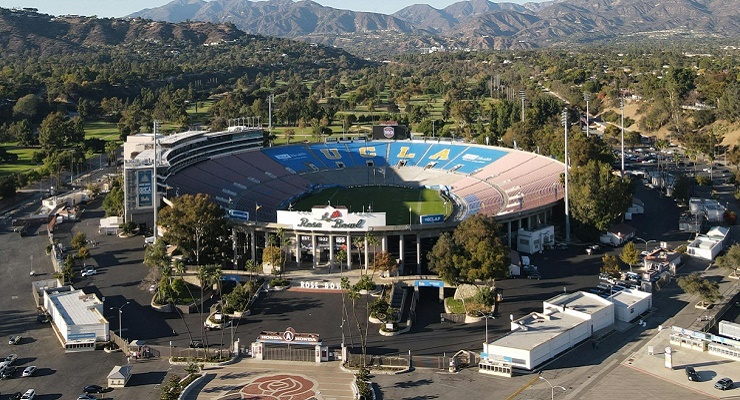Altadena Now is published daily and will host archives of Timothy Rutt's Altadena blog and his later Altadena Point sites.
Altadena Now encourages solicitation of events information, news items, announcements, photographs and videos.
Please email to: Editor@Altadena-Now.com
- James Macpherson, Editor
- Candice Merrill, Events
- Megan Hole, Lifestyles
- David Alvarado, Advertising


Thursday, October 30, 2025
Lawsuit: UCLA Officials Said School No Longer Wants to Play in the Rose Bowl
By ANDRÈ COLEMAN, Managing Editor

According to a copy of the lawsuit obtained by Pasadena Now, UCLA told city officials it was leaving the Rose Bowl, ending a century-old partnership and setting off a high-profile legal battle over one of college football’s most storied venues.
In the lawsuit, the City of Pasadena and the Rose Bowl Operating Company (RBOC) accuse The Regents of the University of California, acting on behalf of UCLA, of breaching multiple long-term agreements requiring the Bruins to play home football games at the Rose Bowl through 2044.
The complaint alleges UCLA has now “chosen to disregard previous promises,” informing Pasadena officials that it was “moving on” nearly two decades before its contractual commitment expires.
The suit argues that monetary damages alone would be insufficient to repair the harm, instead asking the court to compel UCLA to honor the contract and continue playing at the city-owned stadium.
Filed in Los Angeles County Superior Court, the lawsuit outlines what city attorneys call a “profound betrayal of trust and tradition,” claiming the university’s plan to relocate games to SoFi Stadium in Inglewood violates binding contracts signed in 1982, 2010, and 2014.
UCLA first signed an agreement to play its home football games at the Rose Bowl in 1982, formally relocating its program from the Los Angeles Memorial Coliseum. That partnership was reaffirmed in a restated lease signed in 2010, which bound UCLA to host all home games at the Rose Bowl through December 31, 2042, and was later amended in 2014 to extend the term to June 30, 2044.
The contract contains a non-compete clause prohibiting the university from playing home games “in any facility located in the Los Angeles area or in Orange County other than the Rose Bowl Stadium.”
Under the terms, UCLA may terminate the deal only if a “Game-Threatening Default” by RBOC prevents the school from hosting a scheduled home game — and even then, the city must first be given notice and an opportunity to cure the default.
In correspondence included in the lawsuit, Pasadena attorneys said they had repeatedly warned UCLA that any move to play games at SoFi Stadium or any other venue in Los Angeles or Orange County would “indisputably constitute a breach” of its lease with the Rose Bowl.
According to the filing, UCLA representatives told the city during phone calls on October 18 and October 23 that the school “no longer wants to play its home football games at the Rose Bowl and wants to ‘move on’ from its contractual obligations,” and suggested a “commercial solution” to end the agreement early.
In an October 28 letter, Pasadena attorney Nima Mohebbi rejected that proposal, writing that the city and the Rose Bowl Operating Company “will not agree to an early termination.” The letter said UCLA “voluntarily extended the term of the Agreement through June 30, 2044″ and “expressly waived any right to terminate early.”
It demanded that UCLA provide written confirmation by 5 p.m. that day that it would comply with its lease through 2044, warning that failure to do so would result in Pasadena seeking “specific performance and declaratory and injunctive relief” to enforce the agreement.
“UCLA’s attempt to walk away from its contractual commitments is not only unlawful but profoundly unfair,” the lawsuit states. “The City and RBOC have relied on UCLA’s promises for decades, investing heavily in infrastructure, maintenance, and improvements that directly benefit the university’s athletic program.”
The Bruins have struggled for years to fill the 88,000-seat Rose Bowl. The lawsuit notes that Pasadena invested more than $150 million in stadium upgrades in 2010, in part to meet UCLA’s requests, on the expectation that the program’s Pac-12 (now Big Ten) profile would translate into sustained attendance; instead, softer crowds, shifting conference schedules, and televised weeknight games have made it harder for the city to recoup those costs through game-day revenue.
SoFi Stadium continues to draw high-profile events that once made the Rose Bowl a premier West Coast destination. Superstar performers such as Beyoncé and Taylor Swift, who both previously played the Rose Bowl, now choose SoFi for their multi-night tour stops, underscoring the shifting entertainment landscape in Southern California.
The Inglewood venue has also secured hosting rights for the 2026 FIFA World Cup, a global showcase that Pasadena’s Rose Bowl — site of the 1994 World Cup Final — unsuccessfully bid to host again.
At roughly 12 miles from UCLA’s Westwood campus, SoFi Stadium is less than half the distance of the Rose Bowl, which sits about 27 miles away in Pasadena.
The proximity has fueled speculation that convenience and access for players and fans factored into UCLA’s decision to explore a move.
Still, city officials argue the Rose Bowl’s tradition, setting, and legacy far outweigh logistical considerations, warning that the loss of marquee tenants and major events to SoFi highlights Pasadena’s growing challenge in maintaining the Rose Bowl’s standing as a premier venue amid modern competition and shifting audience demand.
“For decades, Pasadena and its residents have poured their hearts — and millions of taxpayer dollars — into sustaining and celebrating this partnership,” the complaint reads. “Now, UCLA has chosen to cast that aside.”
The city and RBOC seek declaratory relief confirming UCLA’s contractual obligations, injunctive relief to prevent the move, and additional damages to recover costs linked to stadium improvements made to accommodate the team over the years.
The suit describes the Rose Bowl as a “National Historic Landmark and the beating heart of college football in Southern California,” accusing UCLA of abandoning not only a venue but a civic and cultural institution central to the city’s identity.
“The City and RBOC ask only that UCLA practice what it teaches — that honor still matters, that promises endure, and that integrity is not for sale,” the complaint concludes.
The university has not yet filed a response.
Altadena Calendar of Events
For Pasadena Events, click here












